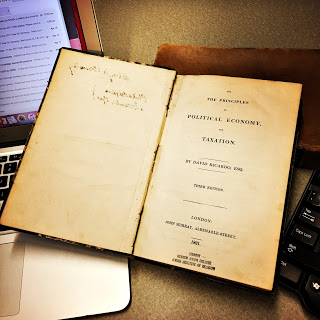On Saturday, April 19th 1817 , David Ricardo published The Principles of Political Economy and Taxation (price was 14s, and 700 copies were printed; later editions had 1000 copies each; my copy above is of the 3rd and definite edition published in 1821, and had at least two previous owners, a college and someone in Philly that signed it in 1901). Most comments on the book tend to emphasize things like rent theory and comparative advantage, but those are not central to the main point of the book (the Wikipedia entry is specially bad). The central question in the book, which follows Ricardo's Corn Essay of 1815 (An Essay On the Influence of a Low Price of Corn on the Profits of the Stock), is that there is an inverse relation between wages and profits, and, distribution is conflictive. That is the essence of the Ricardian theory, and the reason why Marx was a Ricardian, not a minor one as suggested by Samuelson though.The inverse relation between wages and profits is what led Ricardo to criticize Adam Smith's problematic adding up theory of prices, and abandon the notion of labor commanded for the concept of labor incorporated (to keep the labor theory of value), which then led to the search for absolute value. The solution of the problem was elusive and was only provided by Piero Sraffa, the editor of his Works.
Topics:
Matias Vernengo considers the following as important: LTV, Ricardo, Sraffa, Standard Commodity
This could be interesting, too:
Matias Vernengo writes New directions in the Sraffian approach
Matias Vernengo writes Review of Crotty’s “Keynes Against Capitalism” (forthcoming in ROKE)
Matias Vernengo writes Luigi Pasinetti (1930-2023)
Matias Vernengo writes Alternative approaches to the history of economic ideas
On Saturday, April 19th 1817 , David Ricardo published The Principles of Political Economy and Taxation (price was 14s, and 700 copies were printed; later editions had 1000 copies each; my copy above is of the 3rd and definite edition published in 1821, and had at least two previous owners, a college and someone in Philly that signed it in 1901). Most comments on the book tend to emphasize things like rent theory and comparative advantage, but those are not central to the main point of the book (the Wikipedia entry is specially bad). The central question in the book, which follows Ricardo's Corn Essay of 1815 (An Essay On the Influence of a Low Price of Corn on the Profits of the Stock), is that there is an inverse relation between wages and profits, and, distribution is conflictive. That is the essence of the Ricardian theory, and the reason why Marx was a Ricardian, not a minor one as suggested by Samuelson though.
The inverse relation between wages and profits is what led Ricardo to criticize Adam Smith's problematic adding up theory of prices, and abandon the notion of labor commanded for the concept of labor incorporated (to keep the labor theory of value), which then led to the search for absolute value. The solution of the problem was elusive and was only provided by Piero Sraffa, the editor of his Works. For more read this entry on the Labor Theory of Value and this one on Sraffa's Standard Commodity.
There will be a lot of postmortems for the European Union (EU) after Brexit. Many will suggest that this was a victory against the neoliberal policies of the European Union. See, for example, the first three paragraphs of Paul Mason's column here. And it is true, large contingents of working class people, that have suffered with 'free-market' economics, voted for leaving the union. The union, rightly or wrongly, has been seen as undemocratic and responsible for the economics woes of Europe.
The problem is that while it is true that the EU leaders have been part of the problem and have pursued the neoliberal policies within the framework of the union, sometimes with treaties like the Fiscal Compact, it is far from clear that Brexit and the possible demise of the union, if the fever spreads to France, Germany and other countries with their populations demanding their own referenda, will lead to the abandonment of neoliberal policies. Aust…
The economy in Venezuela has collapsed (GDP has fallen by about 14% or so in the last two years), inflation has accelerated (to three digit levels; 450% or so according to the IMF), there are shortages of essential goods, recurrent energy blackouts, and all of these aggravated by persistent violence. Contrary to what the press suggests, these events are not new or specific to left of center governments. Similar events occurred in the late 1980s, in the infamous Caracazo, when the fall in oil prices caused an external crisis, inflation, and food shortages, which eventually, after the announcement of a neoliberal economic package that included the i…

